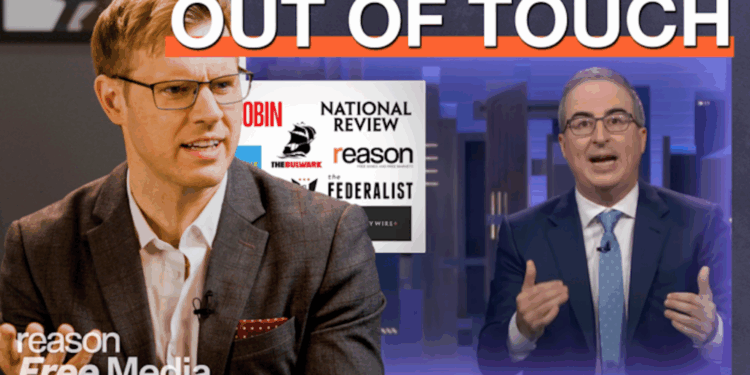John Oliver is the host of HBO’s Last Week Tonight, which is one of the funnier news and comedy shows in the vein of progressive liberal eviscerates conservatives and Donald Trump and nonliberal perspectives. (See Jon Stewart, Stephen Colbert, et al.) As expected, Oliver is not happy about the news that Bari Weiss is now the editor in chief of CBS News following Paramount’s $150 million acquisition of her news site, The Free Press.
In the latest episode of his show, Oliver spent nearly 35 straight minutes skewering Weiss and The Free Press and explaining why she is a bad fit to run not just CBS News, but any news network. In doing so, he betrayed a fundamental myopia about the legacy media’s own failings.
To be fair, some of Oliver’s criticisms are perhaps not entirely without merit. It is true that Weiss has never run a newsroom of this size—CBS News has thousands of employees—though the fact that she created her own media company from scratch and successfully sold it for $150 million just three years later should more or less serve as an endorsement of her managerial skills and news judgment. It’s also true that she came up through the ranks of journalism as an opinion writer rather than a news reporter; The Free Press publishes plenty of reported content, however, as do other opinion-centric news outlets. (So does Reason, but more on us in a minute.)
Oliver has issues with several major Free Press stories, including the outlet’s reporting on starvation in Gaza. An article by Free Press reporter Olivia Reingold responded to viral images of starving children by claiming these children appeared so malnourished because they suffered from other health conditions. The article’s implicit message was that the mainstream media were overemphasizing the harms done by Israel’s war in Gaza. Reingold’s report was, at best, a case of excessive nitpicking—without question, the war had exacerbated the precarious health conditions of Palestinian children.
If Oliver had stuck to that one criticism of The Free Press, his monologue might have been more persuasive. But he also broadened his argument to be against the idea of opinion journalists running newsrooms in general. He even put the Reason logo on screen alongside those of Jacobin, National Review, The Bulwark, Pod Save America, The American Prospect, The Daily Wire, and The Federalist as he attacked the idea of a “pure opinion outlet” being in charge of the news. (Check out the 31:30 mark.)
“I wouldn’t want anyone who led a pure opinion outlet, not even one I happened to agree with, to suddenly be running CBS News,” said Oliver.
This point skips over a very basic fact that often seems to elude people like Oliver: Most mainstream media organizations are already run by people who reflect Oliver’s opinions, sensibilities, and news judgment. Reporters, editors, and managers at major media companies skew overwhelmingly to the left. The only places where this isn’t true are explicitly conservative news organizations, most of which do not pretend that their own ideological convictions can be readily set aside.
Progressive staffers may tell themselves that their own progressive political biases do not shape their coverage decisions—and they may even convince themselves that this is the case—but the fact of the matter is that reporting even straight news requires making editorial judgments all the time: These decisions are frequently ideological in nature. At its most basic, the choice to give more or less airtime to negative reporting on one political party or the other is liable to be swayed by the politics of the company doing the coverage. True neutrality is exceedingly difficult and probably requires a level of disinterest in politics that is ill-suited for the job of being a newsman.
A better route, in my personal opinion, is for news reporters, editors, and the companies they work for to be more open about their ideological perspectives and their political biases. They can work to counteract them by platforming commentary from a wide range of people who do not share their own views. Reason, for example, readily admits to being a libertarian publication; Reason writers are encouraged to be open about our ideas and even to admit who we are voting for in the presidential election. We invite nonlibertarians to participate in our videos: For instance, I host a weekly news and debate series, Free Media, which engages with viewpoints on the left and the right.
In that sense, Oliver’s own ideological offerings are narrower than ours. If you browse his show’s episode archive, it seems obvious that he has virtually never taken a stance that would alienate progressive sensibilities—not even once. That’s his right, of course: He should produce as many takedowns of nonliberals as he likes! But most of legacy media is already a lot like this.
Putting a heterodox thinker in charge of CBS News—one who disagrees with some of the progressive left’s shibboleths—is indeed revolutionary, because Weiss’ opinions are unique. The mere fact that she has opinions at all is not actually revolutionary.
Watch more episodes of Free Media here.

















